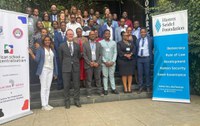The 3rd African School on Decentralisation (ASD) 2023
Background
The third African School on Decentralisation, a two-week international postgraduate certificate programme, jointly offered by the Dullah Omar Institute and the Centre for Federal Studies of Addis Ababa University, was held in Addis Ababa from 3 to 15 September 2023.
This year’s theme was "Giving Effect to the African Charter on the Values and Principles of Decentralisation, Local Governance, and Local Development". The objective was to give content to, promote, and contribute to the operationalization of the African Union´s Charter on the Values and Principles of Decentralisation, Local Governance, and Local Development. A total of 29 participants, selected from 22 African Countries took part in this training.
Course content, delivery & activities
The ASD trained participants on basic concepts of decentralisation and the practice in African countries from a comparative and interdisciplinary perspective. The participants took part in interactive panel discussions, lectures, debates, case studies, site visits to African Union Headquarters, reports, and suggestions.
It was a knowledge-sharing programme on the vast array of issues linked to decentralisation in Africa thus contributing towards increased knowledge and research outputs, policy innovation, and the promotion of good governance in the continent. Participants were continuously evaluated through web-based tests, individual and group assignments, and presentations. At the end of the course, a general assessment was administered and a postgraduate certificate was guaranteed to be issued to the participants who passed.
This training was made possible with financial support from the Hanns Seidel Foundation (HSF) (South Africa and Kenya) and South Africa´s National Research Foundation through the South African Research Chair (SARChi) in Multilevel Government which is based at the DOI. The contents of this report are the sole responsibility of the organisers ASD. It does not necessarily reflect the views of HSF or the NRF.
Participants
The training participants included government employees (local, regional, and national), postgraduate researchers, employees of local and international NGOs and civil society organizations, as well as other participants with an interest in decentralisation in Africa. The total number of participants was 29 (males: 13; females: 16) from 22 African countries.
Opening session
The opening session was addressed by Prof Vivienne Lawack, Deputy Vice-Chancellor of the University of the Western Cape (UWC), Prof Lukas Muntingh (Director of the DOI), Mr Robertson Kabucho (HSF- Kenya), Dr Emebet Mulugeta (Vice-President AAU) and Dr Ketema Wakjira (Director of Center for the CFGS). Sithole Mbanga, CEO of the South African Association of Local Government (SALGA), delivered a keynote address.
Course facilitators and presenters
The rest of the course was presented by scholars and practitioners who were invited from different universities, research institutions, companies, and civil society organisations. They brought tremendous wisdom, experience and energy to the group. Below is an overview of the course facilitators and presenters.
|
Prof Nico Steyler |
Professor Emeritus Professor, Dulah Omar Institute of Constitutional Law, Governance and Human Rights of the University of Western Cape (UWC) |
|
Prof Jaap de Visser |
Chair in Multilevel Government Law, University of Western Cape (UWC) |
|
Prof Tinashe Chigwata |
Associate professor and Head of Multilevel Government at the Dulah Omar Institute (DOI), University of Western Cape (UWC) |
|
Prof Zemelak Ayele |
Associate Professor, Center of Federalism and Governance, Addis Ababa University (AAU) |
|
Prof Eva Maria Belser |
Chair for Constitutional and Administrative Law at the University of Fribourg and a UNESCO chair in Human rights and Democracy |
|
Dr Douglas Singiza |
Judge, High Court of Uganda |
|
M. Baba Dodo |
Governance expert at STRATEGIES! Firm |
|
Prof Solomon Negussie |
Associate Professor, College of Law and Governance Studies, Addis Ababa University |
|
Dr Henry Paul Gichana |
Lecturer and Head of the Center for Legal Aid and Clinical Legal Education (CLACLE), Kabarak University School of Law, Kenya |
|
Prof Chirstophe van der Beken |
Associate Professor, Center for Federalism and Governance, Addis Ababa University (AAU) |
|
Dr Yeshitila Wondmeneh |
Assistant professor, Center of Regional and Local Development Studies (CRLDS), Addis Ababa University |
|
Ms Paddy Siyanga Knudsen |
Vice President, Global Research Forum on Diaspora and Transnationalism |
|
Prof Tegegn Gebre Egzeabher |
Professor of Urban and Regional Development and Planning, Addis Ababa University |
|
Dr Conrad Bosire |
Lawyer and Consultant |
Evaluation
A survey conducted among the participants indicated that 82% of the participants totally agreed that the topics covered in the course were relevant to their work/studies or projects. 96% totally agreed that they had gained new insights during the course. 86% indicated that these new insights were important for them personally and 93% totally agreed that they would apply the newly gained insights in their work/studies/projects. Participants also went a step further to detail the specific ways in which they intended to apply the newly gained insights in their respective work. The survey and the interaction with the participants gave participants got an opportunity to make proposals relating to the subjects they would like to be covered in future editions of the School, the aspects of the course they did not like as well as proposals relating to alumni activities they would like to take part in going forward.
Click here to view the photo gallery of the 3rd African School on Decentralisation.
A full report of the 3rd African School on Decentralisation can be downloaded here.

